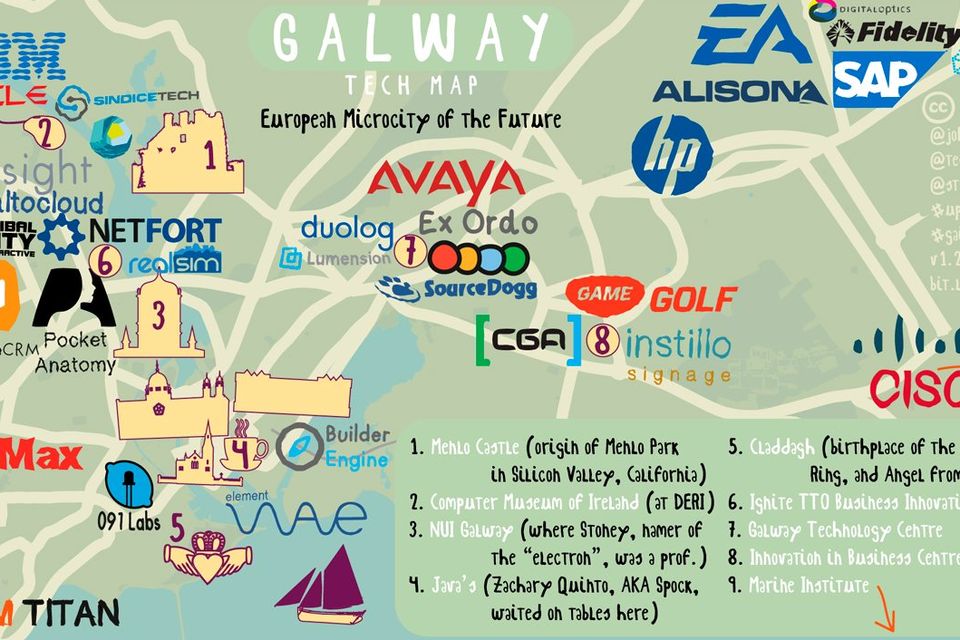Why Galway has become the city of the start-up tribes
Are there ‘real’ tech ecosystems outside Dublin? If so, can they produce top start-ups? Are investors aware of their presence? And what are the pros and cons of setting up a tech start-up outside of Dublin?
Galway is testing the concept with some interesting results. The city that many people associate with music and culture has been carefully building up one of the strongest regional biotech clusters in Europe with multinational outfits such as Boston Scientific and Medtronic adding to local heavyweights such as Creganna. Now, the city is adding to this with a new wave of start-ups that are redefining what it means to grow a tech company in an Ireland outside of the Dublin area.
Start-ups such as OnePageCRM, Duolog, Element Software and Altocloud have broken out to win funding, awards and business all over the world.
Being in Galway hasn’t hurt one bit, say some of the home-grown entrepreneurs who have made it.
“Galway? Dublin? I deal mostly with US people and they see it all as the one thing,” said Mic Fitzgerald, founder of OnePageCRM, an online customer management software firm that now employs 13 people in Galway city.
“The motorway has made the whole thing a moot point as we’re under two hours from Dublin. So if there’s a meeting there I don’t think twice about it. The ecosystem now is Ireland, not Galway or Dublin.”
For early stage start-ups, there are even some infrastructural benefits to being in a regional city.
“You would probably have less of a queue in getting access to supports here than in Dublin,” said Breda Fox, chief executive of the Galway city and county enterprise board. And there are advantages of stability when trying to grow a company, say founders here.
“We’re not competing with as many rivals who might try to poach staff, which is a big issue when you’re trying to grow a company,” said Dorothy Creaven, co-founder of Element Software, one of the city’s fastest growing tech start-ups.
Then there is the city’s unusually large student population. Between NUI Galway (formerly known as UCG) and the Galway Mayo Institure of Technology, Galway has a whopping 26,000 students, with is roughly a third of the area’s population.
But one element increasingly being used to lure talented engineers to companies is lifestyle benefits. While Galway can’t quite match Dublin’s plurality of cafes, restaurants and hangouts, it has some other significant lifestyle attractions.
“We like to think we’re the cool and trendy place compared to Dublin,” said John Breslin, an online entrepreneur who advises some local start-ups and who is also a senior lecturer at NUI Galway.
“When you’re trying to attract people to a place, it’s great to talk up the standard of living. It’s more important than some might think.”
Lifestyle
Breslin’s point was recently made by a kitesurfing event in nearby Achill Island, where one of the world’s most successful technology investors convened a kitesurfing retreat that combined investors, start-ups and other technology experts. Bill Tai, who has backed A-list digital companies such as Tango, Tweetdeck and Voxer, chose Ireland’s west coast specifically for its proximity to world-class natural outdoor facilities.
“What I found is that it [kitesurfing and its lifestyle] becomes a magnet for super-interesting younger tech folks that are differentiated by an interest in extreme sports and who have often been successful their whole lives,” said Tai. “For me, it has become a good filter and a flywheel for attracting people who achieve great results.”
This lifestyle tie-breaker was recently summed up by Barry O’Sullivan, former senior vice president of Cisco and now chief executive of online Galway software start-up Altocloud.
“If Ireland is Europe’s new Silicon Valley, Galway is its San Francisco,” he recently told a gathering of entrepreneurs and investors in Galway.
One sign that the start-up ecosystem is reaching a critical mass in the city is that entrepreneurs such as Shankar Ganesh, founder of the digital signage firm Instillo, are seeking it out to start their companies there.
Other indications that the city is reaching a tipping point include the emergence of specialist networking organisations such as StartupGalway.org. Founded late last year by a group of founders and executives, the outfit now attracts over 100 people to talks and networking events that focus on local success stories and how start-ups are making it abroad.
“We drew inspiration from Boulder, Colorado,” said John Breslin, one of the group’s founders. “That city, which has a great tech ecosystem, has a lot of similarities with Galway. It’s a university city with a similar population and lifestyle.”
Still, with such a relentless spotlight on Dublin as the Irish centre of technology, isn’t there a temptation on founders to relocate there for their new venture?
“A lot of it is coming down to the entrepreneur,” said Barry Egan, programme manager in Galway for Enterprise Ireland. “There are lots of founders who are well able to grow international operations while not being in Dublin. There are also significant benefits in terms of retention of staff, as people are less inclined to jump from firm to firm.”
Others agree.
“It comes down to personalities,” said NUIG’s John Breslin. “I look at Galway firms such as Spamtitan and OnePageCRM who have customers all over the world and whose founders have such drive. Of course they could go elsewhere if they wanted. But if you‘re driven enough and single-minded, it doesn’t matter where you are. It comes down to the individuals who want to do it.”
Where to look for resources
For young companies with a great idea, where do you go or who do you talk to? One option is to consider the local enterprise board. Galway’s enterprise board has seen some solid start-ups come through its doors in the last three years.
“We’re the third most active enterprise board in the country,” said Breda Fox.
“Last year, we paid out about €1m in cash across around 25 start-ups and that doesn’t include other supports, such as employment supports. There are some really good start-ups here in Galway with a very active ecosystem, supports and peer network.”
Fox says that she has overseen 13 transfers to higher-funding supports from Enterprise Ireland. “And 80pc of these would be tech start-ups,” she said.
Another avenue is Enterprise Ireland itself. Traditionally, the organisation has dealt with more advanced start-ups, including those that have attracted funding independently.
“We define a start-up as an early stage company less than five years old,” said Barry Egan, Enterprise Ireland’s director for the Western Region. “Last year, about five high-potential start-ups from the area made it across the line.”
But the agency has begun to get more involved with smaller start-ups in the last year. One programme, in particular, allocates €15,000 to approved start-ups with some office support and no quid pro quo in terms of company equity.
Called New Frontiers, the programme is administered through 14 college campuses throughout the country, including the Galway Mayo IT in Galway city.
“This year, we had 15 young start-ups who made it to the €15,000 grant stage,” said Tony O’Kelly, programme manager for New Frontiers in Galway. “That would have been from around 80 initial applications. The beauty of this grant is that it’s paid directly to the entrepreneur so it gives them time, space and flexibility.”
The programme also sharpens the start-ups’ minds on things such as product development and selling to potential customers.
“We take a ‘lean’ start-up approach,” said O’Kelly. “The key is to start market testing as quickly as possible, which means getting the founders in front of customers. A lot of people who come in to the programme have an engineering mindset and focus very heavily on product. While that’s good, it can sometimes lead to a ‘feature bloat’. Getting them in front of customers often results in a radical change in the product, branding, price-point or route to market.”
So far, this approach seems to be paying some dividends.
“At the end of our first six months, nine of the start-ups had a product on the market, eight had customer sales and seven out of these eight were exporting. So it is possible to get a robust process in place to move the odds in favour of the start-up.”
Join the Irish Independent WhatsApp channel
Stay up to date with all the latest news















